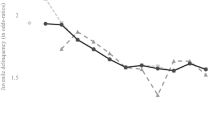Abstract
The purpose of this study was to identify variables that differentially affect parent-adolescent separation in subjects from separated vs subjects from intact families. The subjects were 318 introductory psychology students at the University of Manitoba who had already left home. They were given the Moving Out questionnaire as well as Rotter's Internal-External Locus of Control Scale. Contrary to our hypotheses, subjects from separated families did not experience more conflict when leaving home than subjects from intact families, and the type and amount of divorce-related conflict was not related to higher emotional separation or locus of control scores. However, it was found that as divorce-related conflict became more openly expressed, feelings of personal control increased and feelings about leaving home became more positive. Emotional separation scores were significantly higher for all males and for subjects from separated families. Also, females had a greater sense of external control than males.
Similar content being viewed by others
References
Bane, M. J. (1979). Marital disruption and the lives of children. In G. Levinger, and O. C. Moles, (eds.),Divorce and Separation. Basic Books, New York.
Cherlin, A. (1977). The effect of children on marital dissolution.Demography 14: 265–272.
Douvan, E., and Adelson, J. (1966).The Adolescent Experience. Wiley, New York.
Gibson, H. B. (1969). Early delinquency in relation to broken homes,J. Child Psychol. Psychiat. Allied Dis. 10: 195–204.
Glick, O. C., and Norton, A. J. (1978). Marrying, divorce and living together in the U.S. today.Pop. Bull. 32: 3–38.
Hetherington, E. M. (1972). Effects of father absence on personality development in adolescent daughters.Dev. Psychol. 7: 313–326.
Hetherington, E. M., Cox, M., and Cox, R. (1976). Divorced fathers.Fam. Coord. 25: 417–428.
Hotch, D. F. (1979). Separating from the family: A study of perceptions of home-leaving in late adolescence. Unpublished doctoral dissertation, Michigan State University.
Jacobson, D. S. (1978). The impact of marital separation/divorce on children: II.J. Divorce 83: 3–20.
Kelly, J. B., and Wallerstein, J. S. (1976). The effects of parental divorce: Experiences of the child in early latency.Amer. J. Orthopsychiat. 46: 20–32.
Lipman-Bluman, J. (1984).Gender Roles and Power. Prentice-Hall, Englewood Cliffs, NJ
McCord, J., McCord, W., and Thurber, E. (1962). Some effects of paternal absence on male children. J. Abnorm. Social Psychol. 64: 361–369.
Moore, D., and Hotch, D. F. (1981). Late adolescents' conceptualizations of leaving home.J. Youth Adoles. 10: 1–10.
Moore, D., and Hotch, D. F. (1982). Parent-adolescent separation: The role of parental divorce.J. Youth Adoles. 11: 115–119.
Nye, F. I. (1957). Child adjustment in broken and unhappy homes.Marr. Family Living, 19: 356–361.
Porter, B., and O'Leary, K. D. (1980). Marital discord and childhood behavior problems.J. Abnorm. Child Psychol. 80: 287–295.
Power, M. J., Ash, P. M., Schoenberg, E., and Sorey, E. C. (1974). Delinquency and the family.Brit. J. Social Work, 4: 17–38.
Rotter, J. B. (1966). Generalized experiences for internal versus external control of reinforcement.Psychol. Monog. 80 (1, Whole No. 609).
Rutter, M. (1980). Protective factors in children's responses to stress and disadvantage. In Kent, M. W., and Rolf, J. E. (eds.),Primary prevention of Psychopathology: III. Promoting Social Competence and Coping in Children. University Press of New England, Hanover, NH.
Rutter, M., Graham, P., Chadwick, O. F. D., and Yule, W. (1976). Adolescent turmoil: Fact or fiction?J. Child Psychol. Psychiat. Allied Dis. 17: 35–56.
Westman, J. D., Cline, D. W., Swift, W. J., and Kramer, D. A. (1970). The role of child psychiatry in divorce.Arch. Gen. Psychiat. 23: 416–420.
Author information
Authors and Affiliations
Additional information
Research interests include separation, divorce, and fster parenting.
Research interests include separation, divorce, and child development.
Rights and permissions
About this article
Cite this article
Proulx, J., Koulack, D. The effect of parental divorce on parent-adolescent separation. J Youth Adolescence 16, 473–480 (1987). https://doi.org/10.1007/BF02202941
Received:
Accepted:
Issue Date:
DOI: https://doi.org/10.1007/BF02202941




